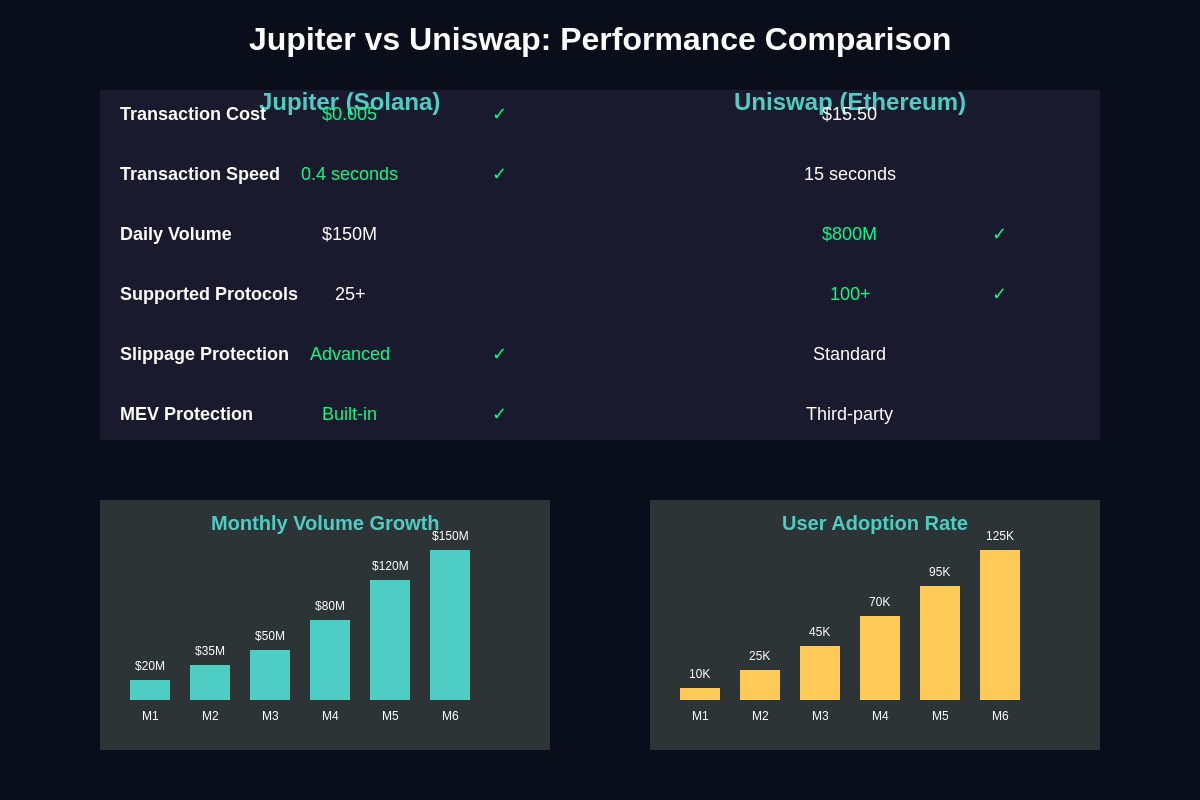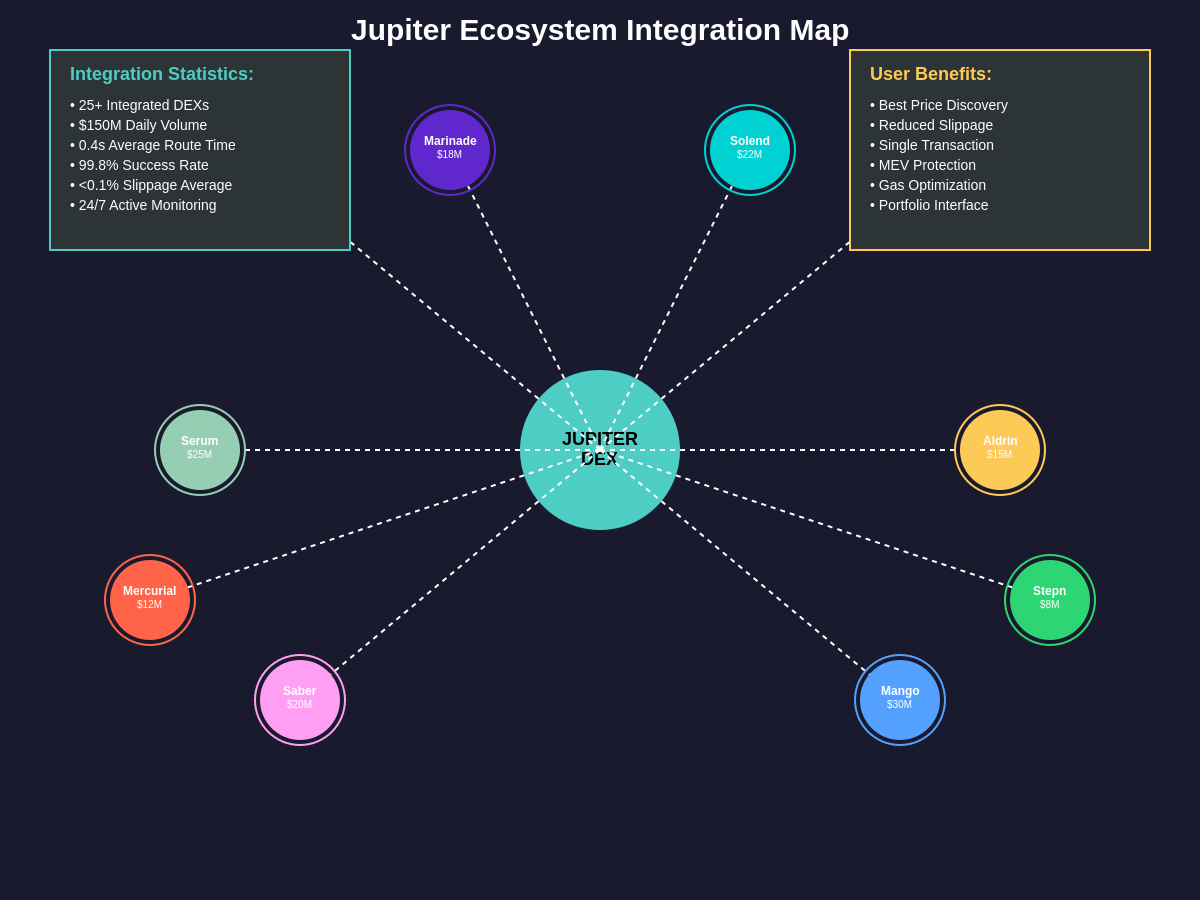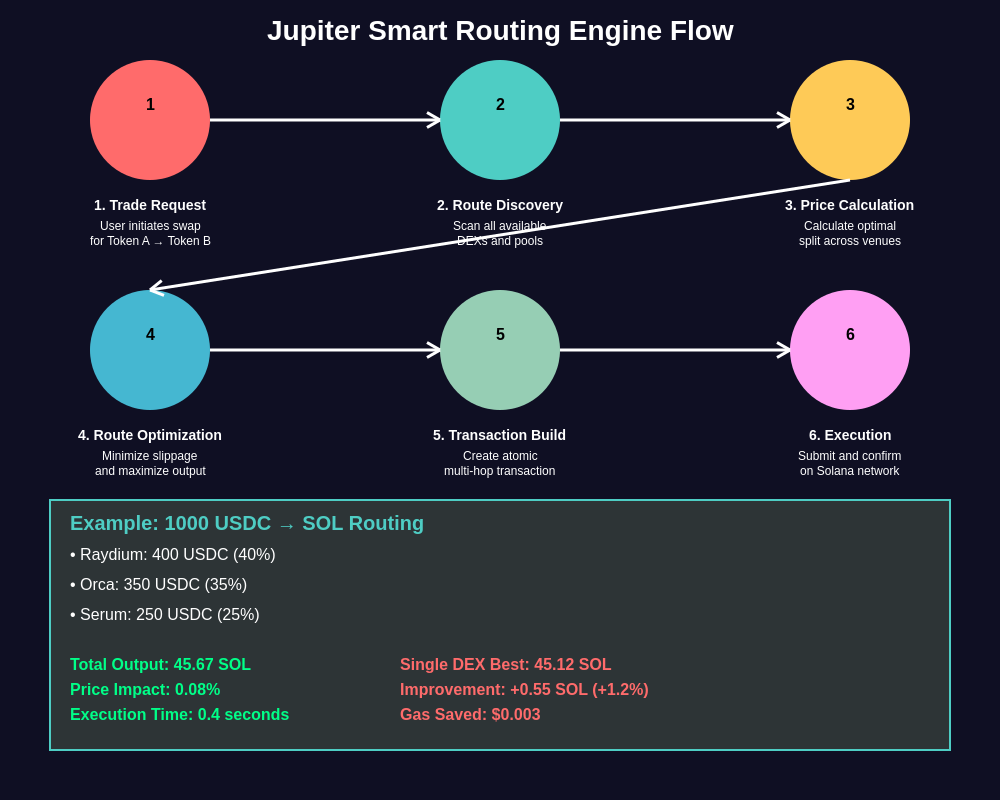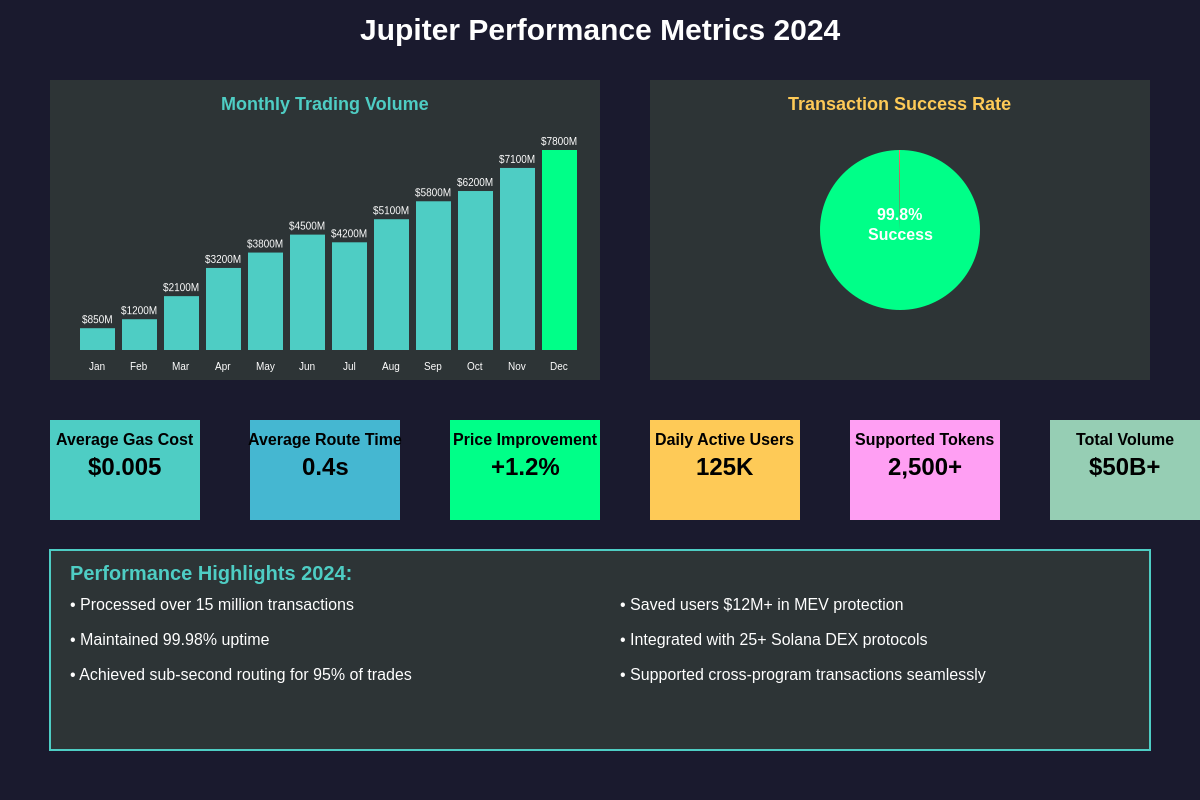Access TradingView’s comprehensive Solana analysis tools to track Jupiter’s performance and market impact in real-time.
The Rise of Solana’s Premier DEX Aggregator
Jupiter has emerged as the dominant decentralized exchange aggregator on Solana, fundamentally transforming how users access liquidity across the ecosystem while challenging Ethereum’s long-standing supremacy in decentralized finance. This sophisticated protocol has successfully aggregated over $50 billion in trading volume since its inception, establishing itself as the go-to platform for optimal trade execution on Solana’s high-performance blockchain infrastructure.
The platform’s ascension represents a significant milestone in the broader narrative of blockchain scalability and user experience optimization, demonstrating how next-generation protocols can deliver superior performance while maintaining the decentralized principles that define the DeFi movement. Jupiter’s success story illustrates the potential for alternative blockchain ecosystems to compete effectively with Ethereum’s established DeFi infrastructure by leveraging superior technical capabilities and innovative architectural approaches.
Technical Architecture and Smart Routing Engine
Jupiter’s technical foundation rests on a sophisticated smart routing engine that continuously scans across multiple Solana-based DEXs to identify optimal trading paths for users seeking the best possible execution prices. The platform integrates with major Solana DEXs including Raydium, Orca, Serum, Aldrin, and dozens of other liquidity sources, creating a comprehensive aggregation layer that maximizes trading efficiency while minimizing slippage and transaction costs.

The routing algorithm employs advanced mathematical models to calculate optimal split orders across multiple venues, often breaking large trades into smaller components that can be executed simultaneously across different liquidity pools to achieve superior pricing than would be available on any single exchange. This approach leverages Solana’s parallel transaction processing capabilities to execute complex multi-hop trades within single transaction blocks, providing users with atomic execution guarantees while maintaining optimal pricing.
Jupiter’s architecture incorporates real-time price discovery mechanisms that continuously monitor liquidity conditions across integrated exchanges, adjusting routing decisions dynamically based on current market conditions, available liquidity depths, and transaction fee structures. The platform’s ability to process these calculations and execute trades within Solana’s sub-second finality windows provides users with pricing advantages that would be impossible to achieve on slower blockchain networks.
Performance Metrics and Market Impact
The performance metrics achieved by Jupiter on Solana demonstrate the transformative potential of high-throughput blockchain infrastructure for DeFi applications, with the platform consistently processing trades at costs below $0.01 while maintaining execution speeds that rival centralized exchanges. These performance characteristics have enabled Jupiter to capture significant market share from Ethereum-based aggregators, particularly among users seeking cost-effective access to diverse cryptocurrency markets.
Monitor Jupiter’s trading volumes and performance metrics through TradingView’s advanced charting tools to understand the platform’s growing market influence.
Jupiter’s total value locked and daily trading volumes have grown exponentially throughout 2024, with the platform regularly processing over $100 million in daily trading volume while maintaining consistently low failure rates and optimal price execution. The platform’s success has contributed significantly to Solana’s overall DeFi ecosystem growth, attracting users who previously relied exclusively on Ethereum-based protocols due to superior cost and speed characteristics.
The competitive landscape analysis reveals Jupiter’s growing influence in challenging Uniswap’s traditional dominance in the DEX aggregation space, particularly among users prioritizing transaction cost efficiency and execution speed over ecosystem maturity. While Uniswap maintains advantages in terms of total liquidity and protocol diversity, Jupiter’s technical superiority in transaction processing has created a compelling alternative for users seeking optimal trading experiences.
Ecosystem Integration and Supported Protocols
Jupiter’s comprehensive integration strategy encompasses the entire Solana DeFi ecosystem, connecting users to liquidity sources across spot trading, derivatives, lending protocols, and yield farming opportunities through a single unified interface. The platform’s partnerships with major Solana protocols including Mango Markets, Marinade Finance, and Solend create seamless user experiences for complex DeFi strategies that would traditionally require multiple separate transactions and interfaces.

The integration architecture extends beyond simple token swapping to include advanced features such as limit orders, dollar-cost averaging, and automated rebalancing strategies that leverage Jupiter’s routing engine to optimize execution across multiple protocols simultaneously. These features demonstrate how aggregation platforms can evolve beyond basic swapping functionality to become comprehensive DeFi infrastructure providers.
Jupiter’s API and developer tools have enabled third-party applications to integrate sophisticated trading capabilities without building custom routing logic, accelerating innovation across the Solana ecosystem while standardizing optimal execution practices. The platform’s open-source approach to core routing algorithms has fostered community contributions that continuously improve execution quality and expand protocol support.
Tokenomics and Governance Framework
The Jupiter ecosystem operates through a carefully designed tokenomics model that aligns incentives between users, liquidity providers, and protocol contributors while maintaining sustainable economics for long-term platform development. The native JUP token serves multiple functions within the ecosystem, including governance participation, fee reduction mechanisms, and rewards distribution for active platform participants.
Jupiter’s governance framework enables token holders to participate in critical protocol decisions including fee structures, new protocol integrations, and treasury management strategies that affect the platform’s long-term sustainability and growth trajectory. The decentralized governance model ensures that platform evolution reflects the interests of actual users rather than centralized development teams, creating alignment between protocol success and community benefit.
The economic model incorporates innovative mechanisms for sharing trading fee revenues with active community members while maintaining sufficient protocol reserves for continued development and ecosystem expansion. This approach creates sustainable incentives for long-term platform engagement while avoiding the unsustainable token distribution models that have affected other DeFi protocols.
Security Architecture and Risk Management
Jupiter’s security infrastructure incorporates multiple layers of protection designed to safeguard user funds and maintain platform integrity across complex multi-protocol interactions. The platform’s smart contract architecture undergoes regular security audits by leading blockchain security firms, with all critical components subject to formal verification processes that ensure mathematical correctness of routing algorithms and fund handling procedures.
The risk management framework includes sophisticated monitoring systems that detect anomalous trading patterns, potential sandwich attacks, and market manipulation attempts that could negatively impact user trading outcomes. Jupiter’s integration with Solana’s runtime environment provides additional security benefits through the blockchain’s built-in protection mechanisms against common attack vectors that affect other blockchain networks.
Analyze Jupiter’s security metrics and performance data using TradingView’s comprehensive security analysis tools.
The platform maintains transparency regarding security practices through regular security reports and real-time monitoring dashboards that enable users to assess platform safety before executing trades. Jupiter’s commitment to security transparency includes open-source publication of critical smart contract components, enabling community security researchers to contribute to platform safety through collaborative code review processes.
User Experience and Interface Design
Jupiter’s user interface represents a significant advancement in DeFi platform design, combining sophisticated functionality with intuitive user experiences that make complex trading strategies accessible to users across all experience levels. The platform’s design philosophy prioritizes clarity and efficiency, presenting users with clear information about trade execution paths, expected outcomes, and associated costs before transaction confirmation.

The interface incorporates advanced features such as real-time price impact visualization, slippage protection mechanisms, and detailed transaction previews that enable users to make informed decisions about trade execution parameters. Jupiter’s commitment to user experience extends to mobile optimization and responsive design principles that ensure consistent functionality across different devices and usage contexts.
Educational resources integrated directly into the platform interface help users understand complex DeFi concepts such as impermanent loss, liquidity mining, and yield optimization strategies, reducing barriers to entry for newcomers while providing advanced tools for experienced traders. The platform’s approach to user education demonstrates how DeFi protocols can balance sophistication with accessibility through thoughtful interface design.
Competitive Analysis with Ethereum DEX Aggregators
The competitive landscape between Jupiter on Solana and established Ethereum aggregators like 1inch and Matcha reveals fundamental differences in blockchain architecture that create distinct advantages and limitations for each platform category. Jupiter’s superior transaction processing speed and cost efficiency provide compelling advantages for users prioritizing frequent trading or smaller transaction sizes, while Ethereum aggregators maintain advantages in total available liquidity and protocol diversity.
Jupiter’s ability to execute complex multi-hop trades within single transaction blocks contrasts sharply with Ethereum’s sequential transaction processing requirements, which often force users to execute complex strategies across multiple separate transactions with associated time delays and cost multipliers. This architectural advantage enables Jupiter to offer more sophisticated trading strategies at lower costs than comparable Ethereum-based solutions.
The analysis of user migration patterns between ecosystems indicates growing adoption of Solana-based DeFi solutions among users seeking cost-effective access to diverse cryptocurrency markets, though Ethereum maintains advantages for users requiring access to specific protocols or token pairs not yet available on Solana. Jupiter’s success in attracting users from Ethereum platforms demonstrates the market’s receptiveness to superior technical performance when supported by adequate liquidity and protocol diversity.
Future Development Roadmap and Innovation
Jupiter’s development roadmap encompasses ambitious expansion plans that extend beyond traditional DEX aggregation to include derivatives trading, cross-chain functionality, and institutional-grade trading infrastructure that could significantly expand the platform’s addressable market. The planned integration of perpetual futures aggregation would position Jupiter as a comprehensive trading infrastructure provider rather than simply a spot trading optimizer.
Cross-chain expansion plans include integration with other high-performance blockchain networks and layer-2 solutions, potentially creating a unified trading interface that spans multiple blockchain ecosystems while maintaining Jupiter’s signature execution efficiency. These developments could position Jupiter as a leading multi-chain DEX aggregator capable of competing directly with centralized exchanges in terms of functionality and performance.
The platform’s research and development initiatives include exploration of advanced trading features such as algorithmic trading tools, portfolio management capabilities, and institutional custody integration that could attract professional trading firms and asset managers seeking decentralized alternatives to traditional trading infrastructure. Jupiter’s evolution toward comprehensive trading infrastructure reflects the broader maturation of DeFi from experimental protocols to production-ready financial systems.
Market Impact and Industry Implications
Jupiter’s success on Solana has demonstrated the viability of alternative blockchain ecosystems for supporting sophisticated DeFi applications, challenging the assumption that Ethereum’s first-mover advantages in DeFi would prove insurmountable for competing platforms. The platform’s achievement of significant trading volumes and user adoption provides evidence that technical superiority in transaction processing can overcome network effects when supported by adequate developer tooling and ecosystem support.

The broader implications of Jupiter’s success extend to questions about blockchain scalability, user experience optimization, and the long-term competitive dynamics between different blockchain ecosystems. Jupiter’s ability to attract users and liquidity from Ethereum-based protocols suggests that blockchain performance characteristics may become increasingly important competitive factors as DeFI markets mature and users become more sophisticated in their platform selection criteria.
Jupiter’s influence on Solana’s overall ecosystem development has been substantial, with the platform’s success contributing to increased developer interest, institutional adoption, and mainstream recognition for Solana as a viable alternative to Ethereum for DeFi applications. The platform’s role as a liquidity aggregator has also improved overall market efficiency within the Solana ecosystem by connecting previously fragmented liquidity sources and reducing price disparities between different trading venues.
Conclusion and Future Outlook
Jupiter represents a compelling example of how next-generation blockchain infrastructure can enable DeFi applications that surpass the performance characteristics of their predecessors while maintaining the decentralized principles that define the space. The platform’s success in aggregating over $50 billion in trading volume while maintaining sub-cent transaction costs and near-instant execution times demonstrates the transformative potential of high-performance blockchain networks for financial applications.
Stay updated with Jupiter’s latest developments and trading opportunities through TradingView’s comprehensive market analysis platform.
The competitive dynamics between Jupiter and Ethereum-based aggregators will likely continue evolving as both ecosystems mature and develop new capabilities, with Jupiter’s technical advantages in transaction processing competing against Ethereum’s advantages in protocol diversity and total available liquidity. The outcome of this competition will have significant implications for the broader DeFi ecosystem and the future development of decentralized trading infrastructure.
Jupiter’s continued innovation in areas such as cross-chain integration, derivatives aggregation, and institutional trading tools positions the platform well for sustained growth and market expansion, though success will ultimately depend on the platform’s ability to maintain technical excellence while navigating the complex challenges of scaling decentralized financial infrastructure. The platform’s journey from innovative Solana protocol to serious challenger to Ethereum’s DeFi dominance illustrates the dynamic and rapidly evolving nature of cryptocurrency markets and the importance of continuous innovation in maintaining competitive advantages.
Disclaimer: This article is for informational purposes only and does not constitute financial advice. Cryptocurrency investments carry significant risks, including the potential for total loss of capital. DEX aggregators involve smart contract risks, impermanent loss, and potential technical vulnerabilities. Always conduct thorough research and consider consulting with qualified financial advisors before making investment decisions. Past performance does not guarantee future results, and all cryptocurrency investments should be considered highly speculative.